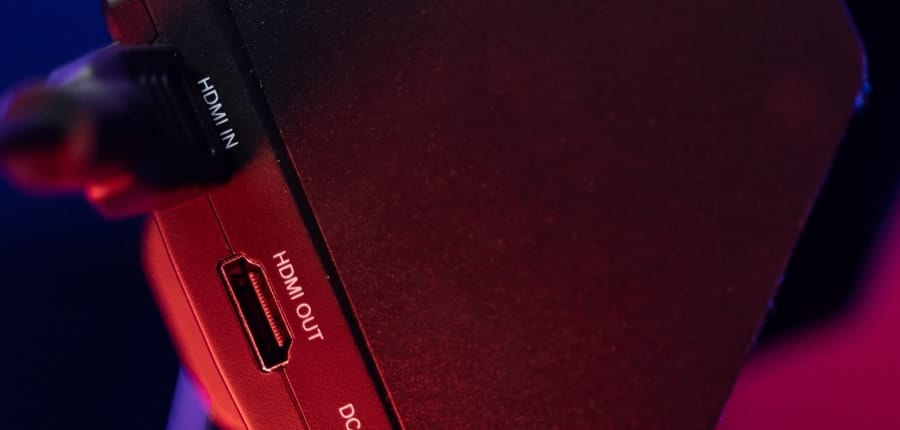
In the modern age of entertainment, there are many ways to watch media through your computer monitor, TV, and other display sources, but this also means there’s more open doors for viruses to infiltrate. One of the best ways to connect these systems together is the HDMI cable. Unfortunately, a growing concern among individuals with their systems is the potential for spreading a virus from one system through an HDMI.
Viruses cannot spread through HDMI. HDMI cables are used to transfer data of a media format such as videos or audio to a screen or another system. to spread a virus, an entire file must be transferred between one system to another that can read it.
“But that doesn’t make sense,” you say. “Playing media is, in essence, opening a file and transferring it through the cable, is it not?” Knowing how a computer virus is constructed and affects systems can help you better understand whether or not to have concerns over a cable such as an HDMI cable or a USB cable when transferring data. Read on for all you need to know on why a virus cannot spread through HDMI.
What Prevents a Virus From Spreading Through HDMI
When most of us think of a computer virus, we think of a malicious program that one can’t see that piggybacks off emails and downloads to attack our system at a computer or a screen viciously. However, a computer virus is a lot like a normal biological virus that one might get just simply taking the train or going through their modern life.
Think of how you get a virus. When you are going through your day, you might simply bump into someone, or they might sneeze on you, and later you feel poorly. The virus literally travels from one individual to another through touch and various other modes of transportation. It then latches onto cells and grows from there, which is what leads to people feeling sick.
While not biological, computer viruses are created by code that has specific designations for where it wants to attach. Think of the DNA or RNA virus much in the same way as this code dictates what the viruses do, where it’s to go and how it will harm a computer or other various software programs.
When transferring data between your PC and the monitor, your monitor does not read the virus itself. It shows an error in the programming of the software systems. That is how you know that a virus has attacked your system, software, or hardware. These viruses can be dormant for long periods of time and attack unexpectedly.
High Definition Multimedia Interface is the full meaning of the acronym HDMI. These cables are specifically designed to transmit video or audio from another digital interface such as a TV or a computer between these systems to HDMI transfer the data so that you can better interact with your PC gaming console or TV itself.
The thing about HDMI is it is not designed to transfer large files between one system and another. These cables are more for translating data such as audio for listening to music or video such as the visual background of a gaming console when you first start it up. As such, they do not have the capacity to load, move, and download files that may contain viruses.
To better illustrate what these cables are used for, here are some of the top areas in your home that you may have an HDMI cable in use:
- Connecting your laptop to your TV to stream movies
- Connecting two monitors together in your office space
- Connecting a streaming box to your TV so you can access program such as Amazon Prime or Roku
- Connecting a home theater system to increase audio from your television
Is HDMI Secure?
With so many ways to use an HDMI cable, is it possible that they could be hacked? Are they, in fact, secure for use within the home? These are all valid questions as these cables are used to do anything and everything from just lounge around and watch some TV to playing online with your friends and even purchasing new games on your system.
At this stage in the game, there do not appear to be any known vulnerabilities to an HDMI cable. That being said, there are always ways that people with malicious intent are looking to receive data that could be private and personal. Companies, however, stress these cables are considered perfectly safe for use.
Despite this, many people still have concerns over the vulnerabilities that may not be 100% visible within these HDMI cables. If someone were to communicate with an HDMI port on a system and attempt to steal your data or invade your privacy, would they really be able to receive all that valid information and affect your personal life?
What Would A Hacker Get from My HDMI?

Okay, so hypothetically: a hacker does, in fact, break into your HDMI port and has weaponized your TV or your laptop. What can they do if they were able to get access through an HDMI cable or an HDMI cord? The fact of the matter is it would be a large waste of time for a hacker to do so.
An HDMI port and HDMI cable are used as a visual medium and an auditory medium. So, what these ports and cables traffic in is only audio or visual media. This media would be, say, a video, a camera, or even a microphone input. Unless you were physically using the computer or present in the room at the time that they were active, they might not necessarily get a whole lot of information.
The scariest thing that they can do using this hack would be to investigate your life and pay attention to what your daily activities are. If you have a camera capability on your laptop, for instance, they may be able to visually see you going around your home. This is bad in terms of them invading your privacy.
That does not put anyone’s mind at ease, but the fact of the matter is this is more applicable for HDMI ports than it is for cables. Without connectivity, cables have no power and cannot transfer data from one place to another. Therefore, hackers do not have the ability to receive any data through that method.
Does the Quality of HDMI Cable Matter?
As with purchasing anything, you always have to wonder whether the quality of the device in the cost of the device makes it a better purchase. When it comes to HDMI, you don’t want to purchase a cable that is merely going to short out or fritz after the first utilization. In that respect, we have some good news: The brand you purchase or the cost does not make the device any less quality.
The things that matter with an HDMI cable or the connectors that are going into the ports as well as the utilization over the years and the potential we’re using them for. Over time your HDMI cable may become damaged and necessitate a new purchase. However, all HDMI cables, regardless of brand, maintain the same security and use throughout their life expectancy.
Final Thoughts
When using any technological device, there are, of course, concerns to be had, especially when it comes to the individual’s privacy and protection. However, we’re setting the record straight on HDMI cables. HDMI cables are a visual-based data transfer device. Because of this, they are unable to transfer larger files between two systems.
This means that viruses that attach the programs are unable to go through your HDMI cable and hit your TV or another system that you are using. HDMI cables cannot transfer large software, and therefore any affected software stays on the original system. You can use HDMI cables safely to enjoy your movies, music, and more.
While there are still some concerns regarding potential HDMI port hacking, the limited capability of receiving information from these ports makes it a less than viable source for hackers just looking for your personal information, such as credit cards. The cable itself has absolutely nothing to do with the hacking process.
When you’re in the store purchasing your next HDMI cable, you don’t necessarily have to worry about buying the priciest most high-quality version of the cable. HDMI cables all serve to do one thing: to help you bring your entertainment to your desired medium. Have fun and enjoy your next movie night knowing you are secure.
